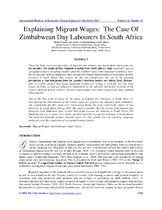| dc.contributor.author | Blaauw, Phillip (Derick) | |
| dc.contributor.author | Pretorius, Anmar | |
| dc.contributor.author | Schoeman, Christie | |
| dc.contributor.author | Schenck, Catherina (Rinie) | |
| dc.date.accessioned | 2013-06-19T08:18:39Z | |
| dc.date.available | 2013-06-19T08:18:39Z | |
| dc.date.issued | 2012 | |
| dc.identifier.citation | Blaaw, P.F., et al. (2012). Explaining migrant wages: the case of Zimbabwean day labourers in South Africa. International Business & Economics Research Journal, 11(12): 1333-1346 | en_US |
| dc.identifier.issn | 2157-9393 | |
| dc.identifier.uri | http://hdl.handle.net/10566/649 | |
| dc.description.abstract | There has been an increasing inflow of migrants and refugees into South Africa during the last two decades. The origin of these migrants is mainly from South Africa’s long-established sources of migrant workers, including countries from the Southern African Development Community. Over the last decade, African immigrants have encountered brutal manifestations of resentment at their presence in South Africa. The reasons for this are multifaceted, but one of the pertinent perceptions is that immigrants from the country’s northern borders are taking South Africans’ jobs. It is often claimed that casual immigrant workers are willing to work for very low daily wages. In doing so, they get temporary employment in the informal and formal economy at the expense of South African workers, who have much higher reservation wages in the same informal labour market.
This is the first study to focus on the wages of migrant day labourers in South Africa by investigating the determinants of day labour wages for migrant day labourers from Zimbabwe. The respondents for this study were interviewed during the first countrywide survey of day labourers in South Africa during 2007. The paper concludes that the income from migrant day labourers from Zimbabwe often exceeds that of the average day labourer in South Africa. The Zimbabweans are, in many cases, better qualified than the average day labourer in South Africa. The main determinants of these migrant wages are their formal level of schooling, language proficiency and the completion of vocational training courses | en_US |
| dc.language.iso | en | en_US |
| dc.publisher | The Clute Institute | en_US |
| dc.rights | © 2012 Blaauw, et al; licensee The Clute Institute. This is an Open Access article distributed under the terms of the Creative Commons Attribution License (http://creativecommons.org/licenses/by/3.0), which permits unrestricted use, distribution, and reproduction in any medium, provided the original work is properly cited. | |
| dc.subject | Migrant wages | en_US |
| dc.subject | Day labourers | en_US |
| dc.subject | South Africa | en_US |
| dc.title | Explaining migrant wages: the case of Zimbabwean day labourers in South Africa | en_US |
| dc.type | Article | en_US |
| dc.privacy.showsubmitter | false | |
| dc.status.ispeerreviewed | true | |
| dc.description.accreditation | International Bibliography of Social Sciences | en_US |

